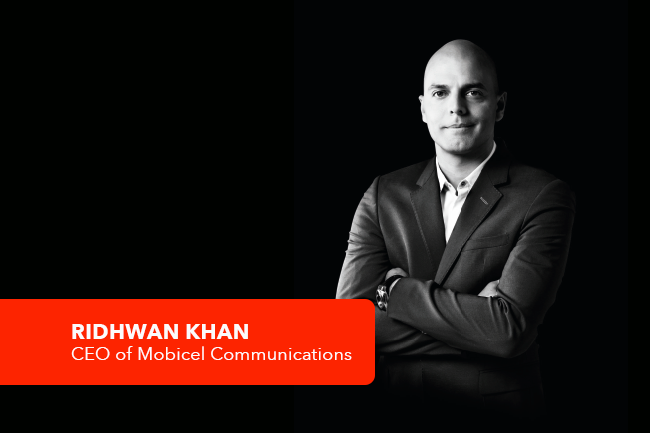Ridhwan Khan is, at essence, a humanitarian. He doesn’t view business as purely for profit, but also as a way to give back to society through his passion and expertise, and this is the entire foundation on which he built Mobicel Communications.
The thought process behind Mobicel in 2001 was a product of Khan’s exposure to the popularity of refurbished and used mobile phones. These he sold from a market stall in the UK where he had gone for inspiration and to expand his horizons. ‘Realising just how sizeable the market was there got me thinking about how much bigger it would be in my homeland, South Africa, where there are millions of people seeking mobile connectivity but cannot afford the cost of handsets,’ says Khan. ‘I saw the opportunity to strike the perfect balance between affordability and quality, with the ultimate aim to manufacture a local range of devices.’
Khan’s broader vision was to build Mobicel into a highly competitive brand, ‘one that could hold its own against major international names that dominated the market’, he says. ‘I also wanted to create a complete, end-to-end communications-technology solution that would encompass every aspect of operations, from research and development, to production, distribution, customer service and technical support.’
By 2010 Mobicel had launched its distribution arm and was rapidly becoming a recognised brand in the retail sector. Two years later it introduced its first smartphone and, in 2014, it expanded into repair and after-sales service centres. This progressive entrepreneurship caught the attention of MTN, which became the first mobile operator in the country to list Mobicel and its devices – with Vodacom, Cell C and Telkom following shortly thereafter.
‘As a result, Mobicel was rocketed into the stratosphere,’ says Khan. ‘We grabbed 14% of the local cellular-device market, pushing aside well-established international competitors and, in the process, became an undisputed leader in home-grown communications technology.’
Since inception Mobicel has launched some 150 new products, with devices now stocked in more than 5 000 retail outlets. Its most recent device is a world-first – Trendy 2 – in that it features Android Go Pie as its operating system, using 4G/LTE connectivity. It’s not the first time either that Mobicel has enjoyed presenting market-disruptor innovation.
‘The Mobicel Hype, launched in 2018, was the first device in South Africa to showcase the Android Go system. In 2017, the Mobicel R9 Plus launched, with a state-of-the-art selfie camera – a 20 MP and 8 MP dual camera,’ says Khan. ‘We also launched South Africa’s first phone equipped with a dual-selfie camera, albeit in a higher price category.’
This confidence trend by Mobicel has motivated other beneficial partnerships (such as the one with Google) outside of those with South Africa’s cellular networks and retailers. ‘When it comes to selecting partnerships, the criterion is fairly straightforward: there needs to be a strong probability of excellent mutual benefit, with each contributor adding unique value to the relationship,’ according to Khan. ‘For instance, on the supply side, we needed partners that could provide top-of-the-line technology at reasonable costs, and on the client-facing side, we knew that relationships with all the networks and retailers would be essential elements of our ongoing success in the market.’ These relationships, and new ones to come, are going to be crucial as Mobicel expands across the continent into new territories.
As it does so, it will be using its key target audience – the youth – to drive growth. Proven in South Africa to be the country’s largest, fastest-growing and most influential population group, it is also ‘a group with the highest demand for cellular connectivity and technology, and the most tech-savvy. Yet it is also the group with the lowest budget, aside from pensioners who are also among our biggest customers in the lower price range’, says Khan.
‘We recognise the youth as the future of all African nations. They are up-and-coming, and more educated and “switched on” than the generation before them, and more discerning when it comes to their technological options. Yet they are not always able to buy the technology they demand, and this is where our “Be more” credo speaks to them, because it aligns with their aspirations and empowers them through information.’
At the same time, Khan sees Mobicel playing a role in economic upliftment across the continent. ‘Where possible, we will continue to lead the way to a better future for any nation in which we are active. We do so with the message that technology and connection are the keys.’



